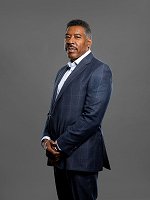| Screencaps Click to enlarge |
1x11 "Leap. Die. Repeat." | |

         
                                                                      
|
||
|
|
||
Leap
Date: |
|
|
| Synopsis: When Ben leaps into one of five people in an elevator at a 1962 nuclear reactor, he must figure which one triggers a bomb that kills them all. Each time the bomb goes off, he leaps into another one of them a few moments earlier, resetting the scene. | ||
|
Audio
from this
episode: |
||
| Episode Menu |
||
| TV Guide
Synopsis Broadcast Date Leap Date Leap Location Name of Leapee Synopsis & Personal Review Project Trivia Ben Trivia Addison Trivia Ian's Outfit Worn in the Episode Kiss With History Miscellaneous Trivia Guest Cast Guest Cast Notes Guests who appeared in other Quantum Leap episodes Characters who appeared in Classic Series episodes Songs & Music Say What? Quotable Quotes Production Photos Production Videos Production Credits Podcasts |
||
Poster
by J.J. Lendl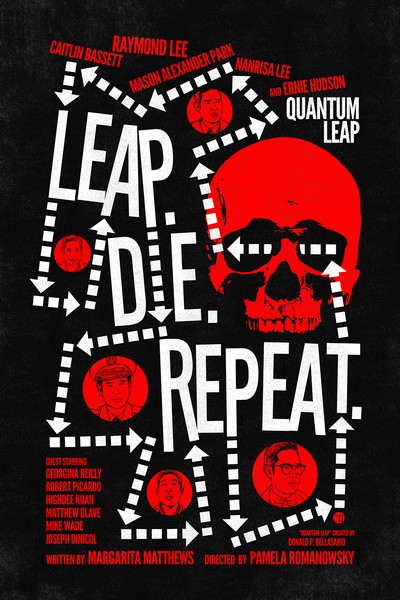 |
||
| Commercial
for this episode: |
||
|
TV
Guide Synopsis: |
||
| Broadcast
Date: Monday, January 30, 2023 @ 10pm on NBC |
||
| Leap
Date: September 12, 1962 |
||
| Leap Location: Classified / Undisclosed location near Fort Worth, Texas |
||
| Names of Leapees (5): Colonel Jack Parker Eugene H. Wagner Mallory Yang Dr. Edwin Woolsey Moe Murphy |
||
| Detailed Synopsis: We find Ben all decked out in a classic military uniform, in an elevator with 4 other people, descending down and down. Ben is a high ranking military person, and is being led to a…. nuclear reactor. We find Dr. Edwin Woolsey (played by Robert Picardo), is the lead scientist, is introducing Ben and others to this facility; it’s demonstration day. It is an experimental nucular reactor, for sustainable energy. We find the primary people in the leap: Eugene Wagner, a young scientist working with Dr. Woolsey. Mallory Yang, a reporter. Colonel Jack Parker (who Ben is currently leaped into), and a Janitor Mo Murphy. As we start to walk in to what appears to be a control room; we see the Janitor cleaning up a spilled drink. We see the reporter start the recording on her recorder and she starts to interview. Ben is in his element thought, finally a leap that he knows a LOT of about, and isn’t lost in what is going on. He is giddy and has to contain himself, like he doesn’t know anything about this type of technology. A TV is flipped on, and is the JFK speech that launches the space race. Addison arrives, and we start to dive into what is the reason for the leap. In the original timeline, the demonstration fails and the funding is pulled. So Addison heads back to Project QL to find out more. Jenn starts to dig into the history of each of the people we just met. Dr. Woolsey died later that day from a heart attack. We head back to the control room and the demonstration is about to start. Dr. Woolsey checks his watch, which is broken. Eugene clicks his pen to start to write down some data notes, but it doesn’t work.. So Ben hands him a trusty old pencil. Jenn and Addison start to look at the other people there, they all died, all in the same very short time period. All their deaths have very very limited details. They figure out this means something is write, a government coverup. Back in the Leap, the count down starts…. The reactor is going on line, just as that is happening Addison rushes back into the imaging chamber. Alarms start to go off in the reactor room, something isn’t right. Addison reappears just as the explosion, the flames rip through the room. We go right back to Project QL: And all the systems monitoring Ben, go dark… dead. Ben has died. The emotions hit the team all in different ways, but Addison collapse in agony and grief. As Ian consoles her…. The display with Ben’s brain waves light up, a heartbeat. Ben is back…. He is alive, and back on line. Addison checks, and yes. Ben is alive, but now he is in the body of Eugene. Right at the same point he started the last leap. Everyone is confused. Ian believes that Ben is in a time loop. A PhD student wrote a paper on it a few years ago… it is Janice. Magic goes to talk to Janice, and appeal to her. And she agrees to help. Back in the leap, that has restarted, we are going through the walk again. The spilled soda, the start of the tape recorder. Ben as Eugene just blurts out that things are going to go wrong, and gets people all worked up. Woolsey starts to check some things, but it is all good. Ben grabs Eugene’s pen and clicks to start writing some notes, but he forgot.. it didn’t work.. Woolsey checks his broken watch again. Ben that directs him to JFK’s speech, to buy some time. Addison and Ben, head into the reactor to look for anything that could be wrong, and boy did they find something. A BOMB is in the reactor. And there is nothing they can do to stop it. The chamber fills with Hydrogen gas, and boom…. It explodes, Ben dies again. And the loop starts again, this time, he is Mallory the reporter. Mallory starts to ask some more probing questions during the interview, but Woolsey is having none of it, and shuts down the interview, cutting her off. Ben (as Mallory) starts to interview the military official. He is there to protect the project from Commies. Now Eugene is interviewed, he has been with Woolsey for years (since a convention). Now the Mo, he loves working there… it is like real-life science fiction. Nothing yet, but we have seen the soda can again, and of course the start of the tape recorder. Woolsey checks his watch. And Eugene tries to take notes with his broken pen. But then Ben accidentally hits the tape deck, and it starts to play something else. A recording from earlier in the day. Mallory is talking about how all of this is a front, and something else is going in here. And she is going to find out what. Boom, the explosion happens, again. It’s Dr. Woolsey’s turn for Ben. He immediately asked Mallory what she knows, and she is pissed. And storms away. Back in Project QL: Ian and Janice have a chat, and get to know each other some more. And Ian tries to convince Janice, that they are NOT the bad guys here. Janice is having none of it though. Janice takes a look at the data again. This isn’t an infinite loop, it is one time around for these 5 people. If Ben doesn’t figure this out in the next two leaps, there won’t be a 6th loop. And just like that, leap #4 comes to the same ending… boom. Ben now loops into Mo, the Janitor, and this is his last leap in this loop. He tries to get to the bomb, to disarm it… but blocked by security. But he realizes he has access to all the offices. He finds a torn up Top Secret document in Woolsey’s desk, that this project isn’t about energy, but weapons. Then the colonel pulls a gun on Ben. Time is running out, the Project QL team has to decide what to do. Turn off the Accelerator, possibly loosing Ben, or let him complete the leap, which looks really bad right now. Magic has to choose between Jenn, who wants to pull the plug, or Janice that says complete the leap. Magic chooses Janice. Back in the leap, the Colonel pulls out a letter he received. It was threats, to kill the project, or “I will”. Ben just figured it all out. Back in the control room. The test is about to start again, Eugene has started the steps. Eugene looks for his book, it is not there. Ben noticed pages were missing, and they are the ones the note the colonel received was written on. Eugene was the one. He admits to it. He reveals the explosive device. It was the PEN.. The pen was the trigger to the bottom and the repeat. Not the soda, not the watch, not the recorder. The colonel shoots Eugene, before he can click the pen.. the leap has been altered. “Saved”. Eugene lets off a reminder about great technology going into the wrong hands. And it sinks into Ben’s thoughts. Ben and Addison talk a bit more, and Ben leaps. Magic and Jenn have some more conversations, about why Magic has had to make the choices he did. Why he chose Janice over her. Why it mattered. Jenn isn’t so sure. As the episode comes to an end, Janice reveals that she may have been wrong about them. And is going to reveal the name, of the person that talked to Ben, to Addison. But then the credits roll, we have to wait till next episode. |
||
|
Personal Review & Detailed Synopsis by Earl Bonovich: So
this was an interesting episode, that was a bit more of a puzzle, and
mystery to solve. It was clear the filmography was chosen, to
divert our attention to several “actions” that could change the
timeline. Which one thing could change everything. In the end, it
was the pen, didn’t even cross my mind during watching that it
would have been the pen. And having Ben leap into Eugene, also
helped with that. The usage of Project QL this week, was the most ever in the series so far. A lot happened there. Ian and Janice. Janice and Magic. Magic and Jenn. Addison and the team, Addison and Janice. A whole lot, and this episode seemed to really be placed, for THAT reason. To add some more depth to those characters, and their part of the bigger story. The time looping was interesting, was a fun way to tell this story. And of course, caught that SG-1 Easter egg, on the name of Dr. Woolsey. Not the best episode of the series so far, and probably will be one that will be forgotten in the long run, except for that Easter egg. But more leaping to come. |
||
| Project
Trivia: Addison can hear what Ben hears, regardless of whether it can be heard by others in the environment Ben is in. She is tuned directly into his brainwaves. Addison says that time travel won't be invented for another 30 years. Literally taken, this means it would be 1992. Assuming Sam Beckett first Leaped in 1995, this falls roughly in line with the original series canon. Ziggy seems too busy to analyze details of the Leap until about halfway through the episode. Ziggy doesn't believe that Ben can Leap into the same body more than once. However, in the original series, Sam Beckett did it multiple times. Perhaps Ziggy was at first confused about this being a time loop, and meant that Ben can't Leap into a host he inhabits at the exact same time again on the same timeline, since a past version of Ben already inhabits that host. This phenomenon of time looping was only explored once before very briefly, when Sam Beckett's time was reset at the end of "Deliver Us From Evil." When Ben "dies" in each scenario, you can hear what sounds like the original series Leap effect blended into the explosion sounds! Ian has to authorize entry into the Imaging Chamber. |
||
| Ben Trivia: As the episode ends, Janis is about to reveal the name of the person who told Ben to Leap. |
||
| Addison Trivia: None this episode. |
||
| Ian's
Outfits Worn in
the Episode: Cream colored flocked blazer with beige shirt and gold necklace. Pleated beige-colored plaid kilt/skirt. |
||
| Kiss With History: John F. Kennedy's speech on this date is partially shown on television. Here is the entire speech: President
John F. Kennedy President Pitzer, Mr. Vice President, Governor, Congressman Thomas, Senator Wiley, and Congressman Miller, Mr. Webb, Mr. Bell, scientists, distinguished guests, and ladies and gentlemen: I appreciate your president having made me an honorary visiting professor, and I will assure you that my first lecture will be very brief. I am delighted to be here and I'm particularly delighted to be here on this occasion. We meet at a college noted for knowledge, in a city noted for progress, in a State noted for strength, and we stand in need of all three, for we meet in an hour of change and challenge, in a decade of hope and fear, in an age of both knowledge and ignorance. The greater our knowledge increases, the greater our ignorance unfolds. Despite the striking fact that most of the scientists that the world has ever known are alive and working today, despite the fact that this Nation's own scientific manpower is doubling every 12 years in a rate of growth more than three times that of our population as a whole, despite that, the vast stretches of the unknown and the unanswered and the unfinished still far outstrip our collective comprehension. No man can fully grasp how far and how fast we have come, but condense, if you will, the 50,000 years of man's recorded history in a time span of but a half a century. Stated in these terms, we know very little about the first 40 years, except at the end of them advanced man had learned to use the skins of animals to cover them. Then about 10 years ago, under this standard, man emerged from his caves to construct other kinds of shelter. Only five years ago man learned to write and use a cart with wheels. Christianity began less than two years ago. The printing press came this year, and then less than two months ago, during this whole 50-year span of human history, the steam engine provided a new source of power. Newton explored the meaning of gravity. Last month electric lights and telephones and automobiles and airplanes became available. Only last week did we develop penicillin and television and nuclear power, and now if America's new spacecraft succeeds in reaching Venus, we will have literally reached the stars before midnight tonight. This is a breathtaking pace, and such a pace cannot help but create new ills as it dispels old, new ignorance, new problems, new dangers. Surely the opening vistas of space promise high costs and hardships, as well as high reward. So it is not surprising that some would have us stay where we are a little longer to rest, to wait. But this city of Houston, this State of Texas, this country of the United States was not built by those who waited and rested and wished to look behind them. This country was conquered by those who moved forward--and so will space. William Bradford, speaking in 1630 of the founding of the Plymouth Bay Colony, said that all great and honorable actions are accompanied with great difficulties, and both must be enterprised and overcome with answerable courage. If this capsule history of our progress teaches us anything, it is that man, in his quest for knowledge and progress, is determined and cannot be deterred. The exploration of space will go ahead, whether we join in it or not, and it is one of the great adventures of all time, and no nation which expects to be the leader of other nations can expect to stay behind in the race for space. Those who came before us made certain that this country rode the first waves of the industrial revolutions, the first waves of modern invention, and the first wave of nuclear power, and this generation does not intend to founder in the backwash of the coming age of space. We mean to be a part of it--we mean to lead it. For the eyes of the world now look into space, to the moon and to the planets beyond, and we have vowed that we shall not see it governed by a hostile flag of conquest, but by a banner of freedom and peace. We have vowed that we shall not see space filled with weapons of mass destruction, but with instruments of knowledge and understanding. Yet the vows of this Nation can only be fulfilled if we in this Nation are first, and, therefore, we intend to be first. In short, our leadership in science and in industry, our hopes for peace and security, our obligations to ourselves as well as others, all require us to make this effort, to solve these mysteries, to solve them for the good of all men, and to become the world's leading space-faring nation. We set sail on this new sea because there is new knowledge to be gained, and new rights to be won, and they must be won and used for the progress of all people. For space science, like nuclear science and all technology, has no conscience of its own. Whether it will become a force for good or ill depends on man, and only if the United States occupies a position of pre-eminence can we help decide whether this new ocean will be a sea of peace or a new terrifying theater of war. I do not say the we should or will go unprotected against the hostile misuse of space any more than we go unprotected against the hostile use of land or sea, but I do say that space can be explored and mastered without feeding the fires of war, without repeating the mistakes that man has made in extending his writ around this globe of ours. There is no strife, no prejudice, no national conflict in outer space as yet. Its hazards are hostile to us all. Its conquest deserves the best of all mankind, and its opportunity for peaceful cooperation may never come again. But why, some say, the moon? Why choose this as our goal? And they may well ask why climb the highest mountain? Why, 35 years ago, fly the Atlantic? Why does Rice play Texas? We choose to go to the moon. We choose to go to the moon in this decade and do the other things, not because they are easy, but because they are hard, because that goal will serve to organize and measure the best of our energies and skills, because that challenge is one that we are willing to accept, one we are unwilling to postpone, and one which we intend to win, and the others, too. It is for these reasons that I regard the decision last year to shift our efforts in space from low to high gear as among the most important decisions that will be made during my incumbency in the office of the Presidency. In the last 24 hours we have seen facilities now being created for the greatest and most complex exploration in man's history. We have felt the ground shake and the air shattered by the testing of a Saturn C-1 booster rocket, many times as powerful as the Atlas which launched John Glenn, generating power equivalent to 10,000 automobiles with their accelerators on the floor. We have seen the site where five F-1 rocket engines, each one as powerful as all eight engines of the Saturn combined, will be clustered together to make the advanced Saturn missile, assembled in a new building to be built at Cape Canaveral as tall as a 48 story structure, as wide as a city block, and as long as two lengths of this field. Within these last 19 months at least 45 satellites have circled the earth. Some 40 of them were "made in the United States of America" and they were far more sophisticated and supplied far more knowledge to the people of the world than those of the Soviet Union. The Mariner spacecraft now on its way to Venus is the most intricate instrument in the history of space science. The accuracy of that shot is comparable to firing a missile from Cape Canaveral and dropping it in this stadium between the 40-yard lines. Transit satellites are helping our ships at sea to steer a safer course. TIROS satellites have given us unprecedented warnings of hurricanes and storms, and will do the same for forest fires and icebergs. We have had our failures, but so have others, even if they do not admit them. And they may be less public. To be sure, we are behind, and will be behind for some time in manned flight. But we do not intend to stay behind, and in this decade, we shall make up and move ahead. The growth of our science and education will be enriched by new knowledge of our universe and environment, by new techniques of learning and mapping and observation, by new tools and computers for industry, medicine, the home as well as the school. Technical institutions, such as Rice, will reap the harvest of these gains. And finally, the space effort itself, while still in its infancy, has already created a great number of new companies, and tens of thousands of new jobs. Space and related industries are generating new demands in investment and skilled personnel, and this city and this State, and this region, will share greatly in this growth. What was once the furthest outpost on the old frontier of the West will be the furthest outpost on the new frontier of science and space. Houston, your City of Houston, with its Manned Spacecraft Center, will become the heart of a large scientific and engineering community. During the next 5 years the National Aeronautics and Space Administration expects to double the number of scientists and engineers in this area, to increase its outlays for salaries and expenses to $60 million a year; to invest some $200 million in plant and laboratory facilities; and to direct or contract for new space efforts over $1 billion from this Center in this City. To be sure, all this costs us all a good deal of money. This year's space budget is three times what it was in January 1961, and it is greater than the space budget of the previous eight years combined. That budget now stands at $5,400 million a year--a staggering sum, though somewhat less than we pay for cigarettes and cigars every year. Space expenditures will soon rise some more, from 40 cents per person per week to more than 50 cents a week for every man, woman and child in the United Stated, for we have given this program a high national priority--even though I realize that this is in some measure an act of faith and vision, for we do not now know what benefits await us. But if I were to say, my fellow citizens, that we shall send to the moon, 240,000 miles away from the control station in Houston, a giant rocket more than 300 feet tall, the length of this football field, made of new metal alloys, some of which have not yet been invented, capable of standing heat and stresses several times more than have ever been experienced, fitted together with a precision better than the finest watch, carrying all the equipment needed for propulsion, guidance, control, communications, food and survival, on an untried mission, to an unknown celestial body, and then return it safely to earth, re-entering the atmosphere at speeds of over 25,000 miles per hour, causing heat about half that of the temperature of the sun--almost as hot as it is here today--and do all this, and do it right, and do it first before this decade is out--then we must be bold. I'm the one who is doing all the work, so we just want you to stay cool for a minute. [laughter] However, I think we're going to do it, and I think that we must pay what needs to be paid. I don't think we ought to waste any money, but I think we ought to do the job. And this will be done in the decade of the sixties. It may be done while some of you are still here at school at this college and university. It will be done during the term of office of some of the people who sit here on this platform. But it will be done. And it will be done before the end of this decade. I am delighted that this university is playing a part in putting a man on the moon as part of a great national effort of the United States of America. Many years ago the great British explorer George Mallory, who was to die on Mount Everest, was asked why did he want to climb it. He said, "Because it is there." Well, space is there, and we're going to climb it, and the moon and the planets are there, and new hopes for knowledge and peace are there. And, therefore, as we set sail we ask God's blessing on the most hazardous and dangerous and greatest adventure on which man has ever embarked. Thank you. |
||
| Miscellaneous
Trivia: The film "Edge of Tomorrow" featured the tagline, "Live. Die. Repeat", where the plot involved a character (Tom Cruise) who dies repeatedly and their timeline is reset each time. Robert Picardo played Richard P. Woolsey in the TV series "Stargate: SG1." His character name in this episode is a direct reference to the Stargate character! The lights hanging in the meeting room at PQL look similar to Ziggy's ball interface from the original series. Mallory (reporter) says something different when she steps out onto the balcony above the nuclear reactor at the beginning of each leap: 1. Far out 2. Groovy 3. Neat |
||
| From the
Quantum Leap Writers Room: That spilled soda can foreshadowed what was about the happen with the reactor…Fizz Pop! To shoot all the different character moments in episode 11, Raymond Lee had to make 14 costume changes! Anyone recognize Joe Dinicol from Martin Gero’s Blindspot? His character’s name was Wagner there too - we love an extended universe! |
||
|
QUANTUM
LEAP – SERIES REGULARS Addison Augustine (Portrayed
by
Caitlin Bassett) –
Addison is a smart, witty, fearless ex-military operative who now
serves as Project Observer at Quantum Leap HQ. She’s in charge of the
technology they use to communicate with the past, and tries to rescue
her fiancee, Ben, from his time-flung existence. Ian Wright (Portrayed
by Mason Alexander
Park) –
Quantum Leap’s nonbinary chief architect of the AI program. Herbert “Magic” Williams (Portrayed by Ernie Hudson) – A Vietnam vet and current head of the time travel project at Quantum Leap. Herbert “Magic” Williams tries to keep the Pentagon at bay while the team tries to rescue Ben. Doctor Sam Beckett leaped into Magic during his Vietnam tour. Jenn Chu (Portrayed by Nanrisa Lee) – Head of security at Quantum Leap HQ. Quirky but formidable, she makes it her mission to figure out why Ben erased all evidence of why he Leaped. |
||
| Guest
Cast: Georgina Reilly as Janis Calavicci Robert Picardo as Dr. Edwin Woolsey Mike Wade as Moe Murphy Matthew Glave as Colonel Jack Parker Highdee Kuan as Mallory Yang Joe Dinicol as Dr. Eugene H. Wagner Jordan Hubbard as Security Guard |
||
| Guest
Cast Notes: Robert Picardo (Dr. Woolsey) was born on October 27, 1953 in Philadelphia, Pennsylvania, USA, where he spent his whole childhood. He graduated from the William Penn Charter School and attended Yale University. At Yale, he landed a role in Leonard Bernstein's "Mass" and at age 19, he played a leading role in the European premiere of "Mass". Later, he graduated with a Bachelor's degree in Drama from Yale University. He appeared in the David Mamet play "Sexual Perversity in Chicago" and, with Diane Keaton, in "The Primary English Class". In 1977, he made his Broadway debut in the comedy hit, "Gemini", with Danny Aiello, and also appeared in Bernard Slade's "Tribute", "Beyond Therapy" as well as "Geniuses" and "The Normal Heart", for which he won a Drama-Logue Award. Then, he became involved in television, where he soon was nominated for an Emmy Award for his role as Coach Cutlip on the series, The Wonder Years (1988). Robert appeared in several other series: China Beach (1988), Frasier (1993), Ally McBeal (1997), Home Improvement (1991), The Outer Limits (1995) and Sabrina the Teenage Witch (1996). In 1995, he got the role of the holographic doctor on Star Trek: Voyager (1995), where he also directed two episodes. He also got roles in The Howling (1981), Star 80 (1983), Get Crazy (1983), Oh, God! You Devil (1984), Innerspace (1987), Munchies (1987), Samantha (1991), White Mile (1994), Star Trek: First Contact (1996), Small Soldiers (1998), Looney Tunes: Back in Action (2003), Quantum Quest: A Cassini Space Odyssey (2010), and so on. He resides in Los Angeles, California with his wife Linda, and their two daughters. Mike Wade (Moe Murphy) is a California native who graduated from College with a B.A. in Psychology. He was bitten by the "acting bug" when he took two acting classes as a senior in College. After working in a corporate environment for a while, Mike finally decided to follow his dream of being an actor. Mike feels fortunate to have found his true passion in life. He has studied at the Howard Fine Acting Studio in Hollywood, California and is a graduate of the Joanne Baron/ D.W. Brown Studio in Santa Monica, California. Mike has always been highly influential among friends, co-workers and family. As an actor he sees his influence increasing. With that power, Mike intends to help children get on and stay on the right path. Matthew Glave (Colonel Parker) was born on August 19, 1963 in Saginaw, Michigan, USA. He is an actor, known for The Wedding Singer (1998), Argo (2012) and Girlfriends' Guide to Divorce (2014). He has been married to Anita Barone since 2000. They have two children. Jordan Hubbard (Security Guard) is known for American Crime Story (2016) and Home Economics (2021). Highdee Kuan (Mallory Yang) grew up in a small rural village in the Netherlands where she discovered her passion for the arts, in particular acting, while studying classical ballet at Dutch Royal Conservatory. She moved back to California to study theater and visual arts at UC San Diego while simultaneously pursuing her acting career. Her initial foray into acting landed her immediate recognition and an acting award in 2016. Highdee is fluent in English, Mandarin, Dutch and German allowing her the opportunity to expand her acting career beyond Hollywood. Joe Dinicol (Eugene Wagner) was born on December 22, 1983 in Stratford, Ontario, Canada. He is an actor and producer, known for Scott Pilgrim vs. the World (2010), Diary of the Dead (2007) and Passchendaele (2008). |
||
| Guests Who Appeared in Other Quantum
Leap Episodes: Georgina Reilly returns as recurring character Janis Calavicci. |
||
| Characters
who appeared in Classic Series episodes: None this episode. |
||
| Songs
& Music: Score music by Daniel James Chan |
||
| Say
What? It is unlikely that an Army Colonel and a team of scientists could be coaxed into delaying a first test of a nuclear reactor by simply being asked to watch a Presidential speech, as Ben suggests in order to buy some time. The obituary for Wade has Nobel prize spelled incorrectly as Noble. Since the bomb is on a timer, why didn't Wagner just set it for a longer time and make up a reason to leave? The statement by Ian that a person who has been struck by lightening is more likey to be struck again doesn't have any facts behind it. Janis appears to be wandering around PQL with no security escort after helping the team, but still withholding vital information. Coronary is spelled incorrectly as cornary on the computer chart showing Ben's body. Zip codes on addresses did not exist in 1962, but one ls listed on Parker's envelope. |
||
| Quotable Quotes: Addison: "Well, it looks like you finally Leaped into your element!" Ben: "No kidding. Bunch of nerds gathered together for the common good... kinda reminds me of--" Addison: "Us?" Ben: "Yeah. When we first joined Quantum Leap." "How do Uranium atoms say goodbye? Gotta split!" -Eugene "What in Groundhog Day is this?" -Ben Magic: "You think she intentionally trapped Ben in a time loop? Why?" Jenn: "I don't know... gain access to our headquarters, plant a virus, steal government secrets..." Magic: "She's already done all that." Addison: "We figure eout which one did it... and Ben leaps." Janis: "Boom." Addison: "Really?" Janis: "Pun intended." Ian: "You poisioned your own mother's tea." Janis: "I didn't poison her. It was a sedative. She deserved it." "It is amazing that you can remember all these plots to these movies, but not that you loved me for four Leaps." -Addison to Ben "We all think we're the hero of our story... even when we're the villian." -Ben "If someone from the future Leaped into 2023 to judge us, I hope we turn out to be the heroes of our story." -Ben to Addison |
||
 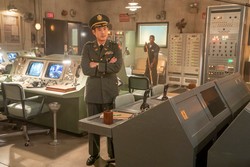 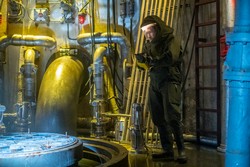
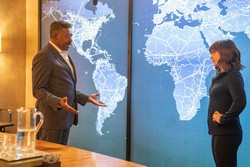 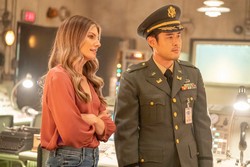 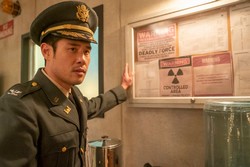 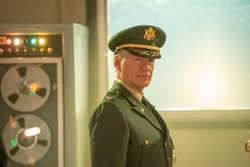 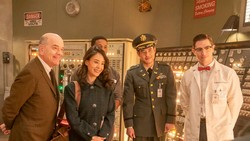 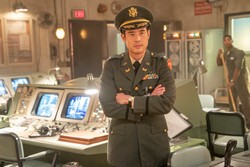 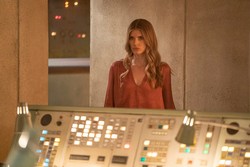 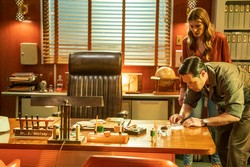 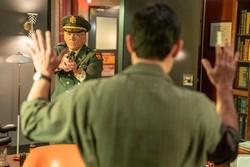 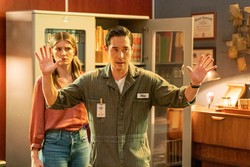 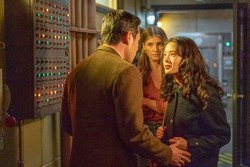 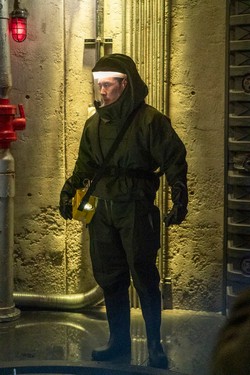 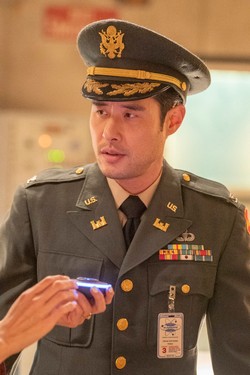 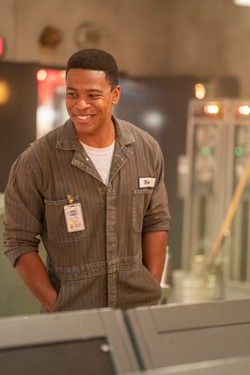 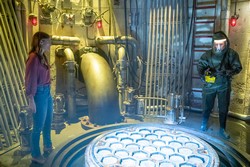 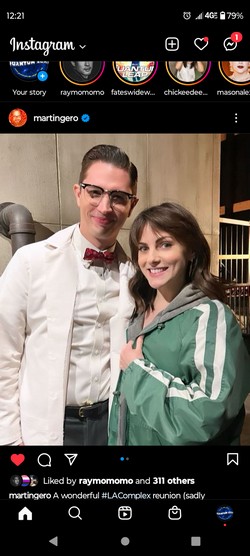 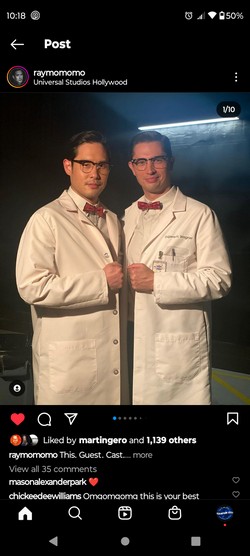 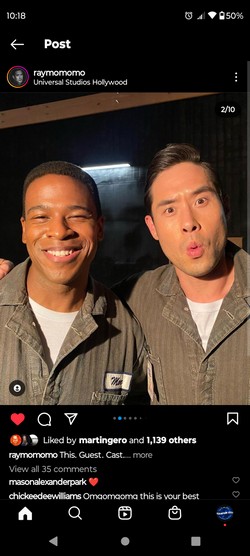 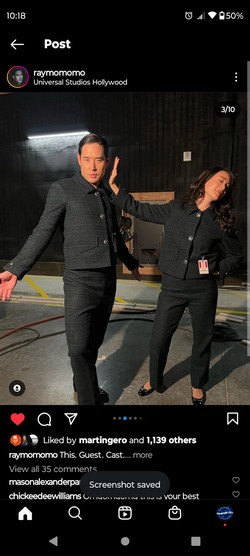 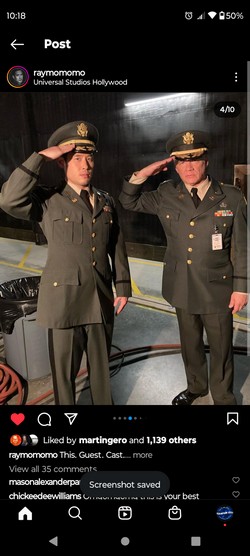 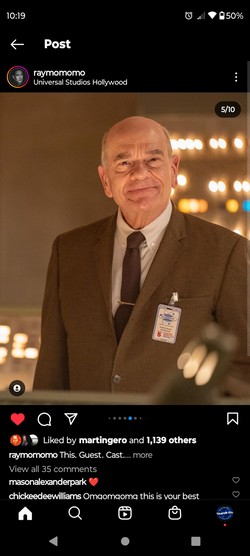 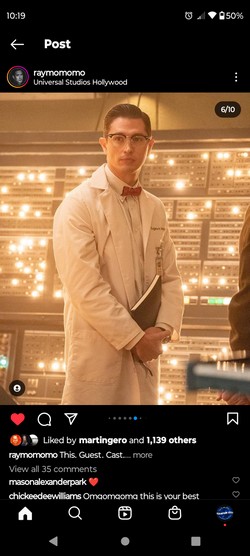 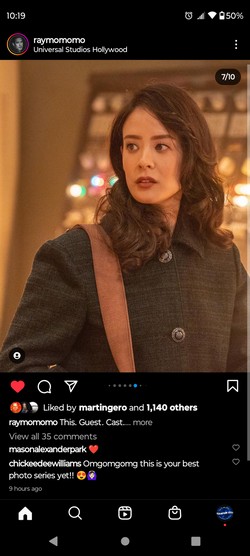 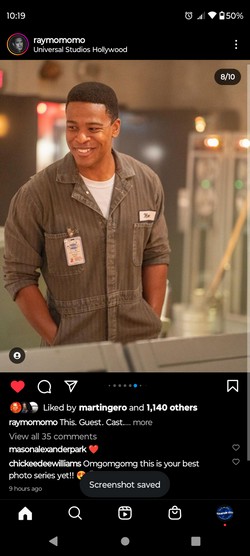 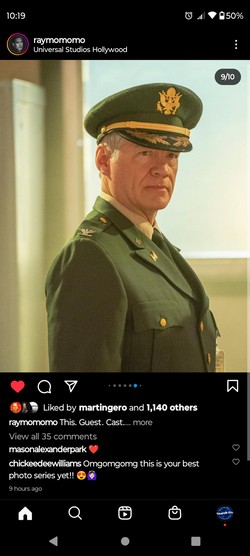  |
||
| Production Videos: Coming Soon |
||
| Production
Credits: Consulting Producer: Moira Kirland Producer: Tim Scanlan Producer: Meg Fister Co-Executive Producers: Benjamin Raab & Deric A. Hughes Co-Executive Producer: Drew Lindo Co-Executive Producer: Aadrita Mukerji Produced by: Marc Bienstock Executive Producers: Steven Lilien & Bryan Wyndrandt Executive Producer: Chris Grismer Executive Producer: Deborah Pratt Executive Producer: Donald P. Bellisario Executive Producer: Dean Georgaris Executive Producer: Martin Gero Developed by: Steven Lilien & Bryan Wynbrandt Created by: Donald P. Bellisario Written by: Margarita Matthews Directed by: Pamela Romanowsky Associate Producer: Ethan Henderson Story Editor: Margarita Matthews Casting by: Jennifer Cooper, CSA Original Casting by: Kamala A. Thomas Director of Photography: Tim Bellen Production Designer: Mayling Cheng Edited by: Ian Mayberry Music by: Daniel James Chan Unit Production Manager: Melanie J. Elin Unit Production Manager: Marc Bienstock First Assistant Director: Cassandra Laymon Second Assistant Director: Athena Alexander Costume Designer: Genevieve Tyrrell A Camera Operator: Dave Hirschman B Camera/Steadycam Operator: Josh Harrison Production Sound Mixer: Beau Hodges Chief Lighting Technician: Donna Vega Key Grip: Peter Chrimes Art Directors: Raf Lydon & Liz Looczkowski Set Director: Tim Stepeck Costume Supervisor: Mark A. Summer Property Master: Erik Grasteit Construction Coordinator: Matt Sazzman Department Head Hair: Amy Marie Wilson Department Head Makeup: Julia Lallas Leadman: David Napoli Stunt Coordinator: Jeff Barnett Location Manager: Dan Milner Transportation Coordinator: Sandra Ninham-Gallardo Production Office Coordinator: Sofie Johanna "Bubbles" Dejus Assistant Production Office Coordinator: Brendan Hickey Production Consultant: Natalie Chiengkul Script Supervisor: Heather Pollock Script Coordinator: Sue Palmer Casting Associates: Lindsay Jameyson & Mia Cascio Post Production Coordinator: Gabriella Scudieri Music Supervisor: Season Kent Music Co-Supervisor: Leah Harrison Music Editor: Zed Starkovich Assistant Editor: Clinton Steeds Online Editor: Richard Wells Colorist: Chris Boyer Visual Effects Supervisor: Trent Smith Visual Effects Editor: Aaron Merrill Supervising Sound Editor: Kelly Cabral Co-Supervising Sound Editor: Kevin Zimmerman Re-Recording Mixer: Yuri Reese & Sean Madsen Video Playback Supervisor: Todd A. Marks Video Playback Engineer: Andrew Miller Computer Playback Engineer: Ian Kadis Video Assistant: Byron Echeverria Special Effects Coordinator: Ryan Amborn The State of California and the California Film Commision, California Soundstage Filming Tax Credit Program Copyright 2023 Universal Television LLC All Right Reserved Dean Georgaris Entertainment Quinn's House Universal Content Productions Universal Television |
||
Podcasts: |
||
| Back to top | ||

























